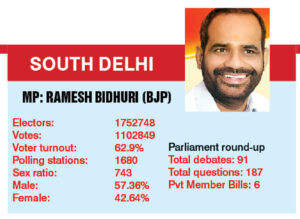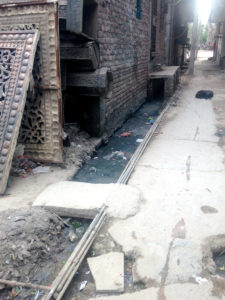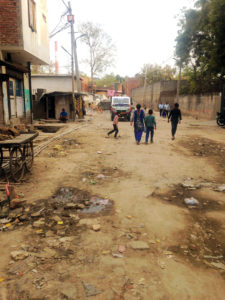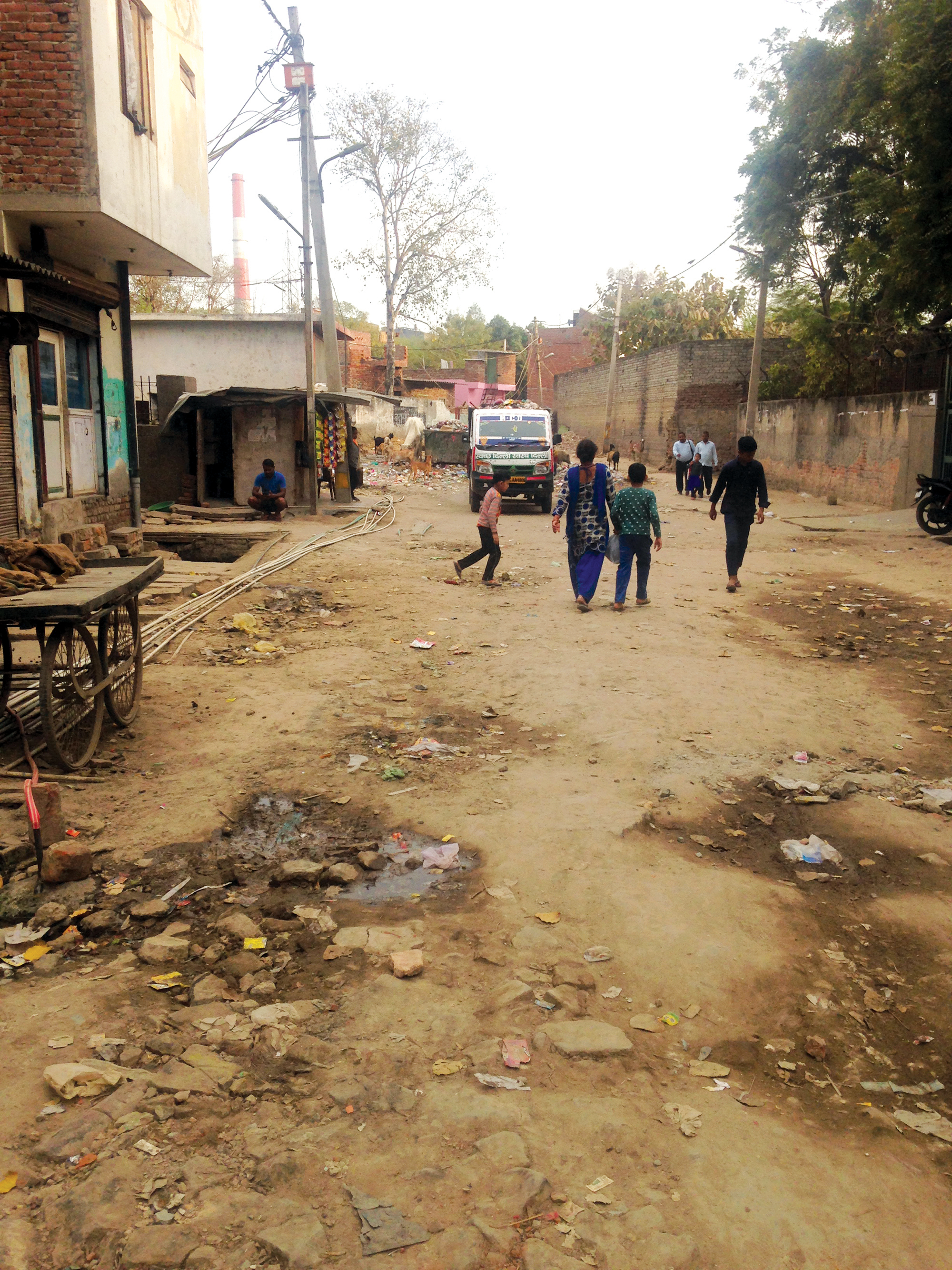There are pockets like Gautam Puri in South Delhi where voters have no hope that any political party will keep the promises made with such a rhetorical flourish
In Gautam Puri, a JJ cluster in Badarpur, there’s no sign of any MP nursing his constituency. No haste to show ‘development’ by paving a road or improving water supply.
The comparatively well-built road ends just as one reaches the corner of the All India Institute of Ayurveda. Then begins the other side of the national capital, your rickshaw hits rocks, mud is thrown up into your face, and the smell and sight of open drains on either side assail your senses.
People here are in dire need. This area is just one of the JJ clusters that comes under the ambit of South Delhi constituency. No, not the posh areas that everyone refers to tauntingly while speaking about South Delhi. After a delimitation exercise in 2008, villages, slums and resettlement colonies have become the dominant part of this area.

In one of these resettlement colonies, Gautam Puri, as you start asking people what their area lacks and the problems, the responses keep coming. They range from water scarcity to lack of sanitisation to crime and abuse.
While homes have been provided with water pipelines, the residents say the water is not fit for drinking, as it is usually muddy. For drinking water, they buy cannisters that look like Bisleri’s 20-litre bottles. Or, like Munni, who has lived here for the past 19 years, wake up at 4 am and head out to the taps which give out the “sweet water”.
When one walks around the area, you can also notice that external taps have been installed illegally which means there’s no measurement of utilisation. This, many residents say, is why people don’t care about how much water is being wasted.
Another woman, Reena (name changed) complains that the dirty water has made her family sick many times. Her brother-in-law, she complains, often suffered from stomach ailments. When the doctor advised them to start buying bottled water, they followed his advice but alas, he fell prey to dengue, another major problem arising from poor sanitation in the area. He passed away in 2013.
This conversation brought us to the next problem. Munni, who was rehabilitated from Gautam Nagar, complained that people throw things into the open drains, clogging up the area. “I generally take a stick myself and fish out the rubbish in the drains. Who will come and do it? The authorities will not. Even the garbage dumps fill up in mounds but the men who come to pick it do so once a week. That too, they come and honk and leave”, giving them no time to collect their garbage.
The uncovered drains overflow during the rains, with dirty sewage water entering homes. They are even used as toilets when the public ones are closed. Many homes in this area do not have their own personal facilities which mean they have to rely on the government provided ones. But even though many complaints have been made to the authorities, many toilets remain closed between 12 to 4 pm and then from 10 pm to 5 am.
So, either they walk further out to one that is open or use the open area around or the open drains. The women here say they are not left with an option.
Also, while these toilets are supposed to be free, the attendants charge Rs 2 for each use, some even Rs 5. “We need toilets. If you have a stomach issue, you can imagine that for every use we have to pay Rs 2, which is too much for us.”
Some women also pointed out to toilet no. 8 in phase 1 which has remained closed for the past 5-6 years. Here, men reportedly use the area to gamble and take intoxicants.
This brings us to their next problem, of law and order. Women here say they constantly feel at risk because boys “high on smack” pass lewd remarks.
Promita, who has been living in the area for the past 12 years has a daughter studying in 6th grade. She says that boys tease girls who study, and the crime in the area makes it impossible for her to work. “I really want to work but I have to be around all the time for my child”, the trained nurse says.
But it’s not just the women who feel unease here. Young boys get bullied by older ones, there’s a constant fear of theft, burglary and even murder rampant in the area.
And this has been the case they say for years. Nothing has changed since the previous government (under the Congress) left and the current under BJP – which won in 2014 by a margin of 107000 (9.71%) votes – led by Ramesh Bidhuri came in. They now think it’s better to get the Congress back. “I went to his (Bidhuri’s) office for my pension documents and the office people sent me away”, Munni says, pointing at the approachability factor, which she says works in the Congress’ favour.
This should be sweet music to the ears of the party whose voter base in Delhi largely lay in the JJ clusters, unauthorised colonies and minority sections. All parties have been trying to tap into this voter base by promising better facilities and ensuring the regularisation of unauthorised colonies.

But while the last elections in the state secured all the seats for the BJP, the runners up in all the seats were from AAP and none from the Congress. Currently, the residents are not happy with AAP MLA Narayan Dutt Sharma, who they say has done nothing for them. They also say he does not listen to them or come to see what their problems are.
This should worry the party, as many here are not aware that these elections don’t mean a change of MLA but a new MP, for which AAP is fielding Raghav Chaddha.
Munni puts her point across quite simply: “Hum toh haato sey roti khaenge, phool sey nahin. Koi koi phool toh behosh bhi kar deta hain” (We will have roti from hand, not flowers, because some flowers can also make one faint”).
A young girl who is a social worker and also lives in the cluster says that when people will see AAP’s broom symbol, they will not think of Chaddha but about the MLA and his empty promises.

The only people who would want to vote for them are the ones who realise that the education system has improved, like 23-year-old Nazma whose family was also relocated from Gautam Nagar.
Then she points at the GST, which made “everything expensive”. “I get so angry when I see the cost of things now. Even the cylinder which was once Rs 400, has cost us Rs 900 sometimes. BJP is not liked that much”.
Her parents don’t tell her who to vote for, “It’s my decision” but she does say that her father joined as a party worker for AAP and “they promised jobs for us (she has four brothers and a twin sister) but nothing happened, so he feels cheated.”
Policing
In the area, at least 20 women we spoke with complained about the police in their area who they said do not respect women.
“Even in rape cases, the police say just solve it by talking. Even they refuse to give the justice that law must”, one resident told us. They also accused the police of taking bribes from offenders and letting them off after a day of imprisonment.
“Police even come and ask about who made the complaint and make it hell for the complainant”, another added.
What is even more worrying is the fact that there is still rampant domestic abuse in the area — and the women do not hesitate to call it out. Sonia, who actively helps women out in such cases, says that there are times when the police would ask the victim, “Mujhse pooch ke shadi kiya kya, toh ab kyun aa rahi ho?” (Did you get married after asking me, so why come now?).
“For women, nothing has changed. Some women don’t even think that there’s something wrong happening,” she adds. Which party, however, would make this change and make it safer for women and inclusive is still a question that does not have an answer.
But for the people living in the areas there’s a lot of empty promises they have to contend with.





